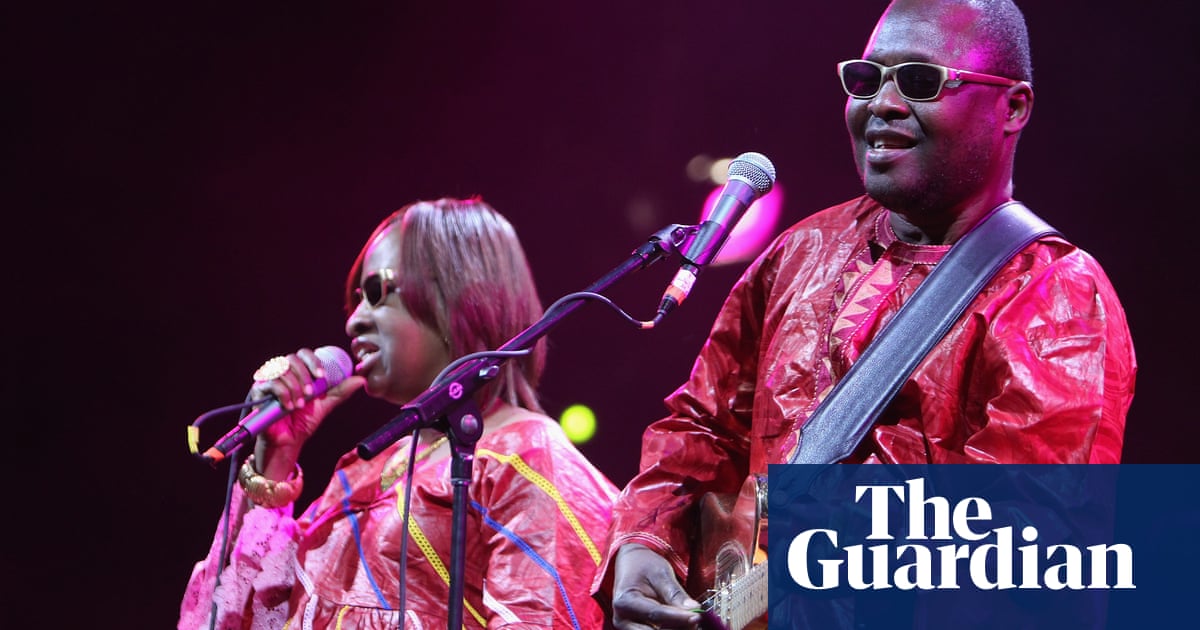One of the most extraordinary success stories in the history of African music began in 1978 in the south of the Malian capital, Bamako, in the Institut des Jeunes Aveugles, a school for young blind people. It was there that Amadou Bagayoko and Mariam Doumbia began to make music together. Over two decades later, by now married and known as Amadou & Mariam, “the blind duo of Mali” (as they were once billed) became an award-winning commercial triumph, headlining at festivals and concerts around the world.
Amadou, who has died aged 70, played the electric guitar, sang with Mariam, and wrote or co-wrote many of their songs. They had enjoyed a lengthy, sometimes difficult career together when their lives were transformed by a collaboration with the French-Spanish globally-influenced pop star Manu Chao. He heard one of their songs on the car radio while driving through Paris, and offered not just to produce their next album but to co-write and sing on some of the tracks, adding his slinky, rhythmic style to the duo’s rousing blend of African R&B. The result,Dimanche à Bamako(2004) introduced the duo to a new global audience, selling half a million copies worldwide and reaching No 2 in France.
Blending gutsy blues-rock and impressive guitar work from Amadou on the songCoulibalywith a stomping dance piece,La Réalité, or the cheerfully rousingBeaux Dimanches, this was crossover music that appealed to rock and pop fans as well as enthusiasts for African music. WhenI askedAmadou about his guitar style, he told me: “I love English music and started out listening to Alvin Lee, Eric Clapton, David Gilmour and Bad Company – and trying to find a link between them and our Bambara culture.”
Amadou & Mariam now had a chance to show a wider audience that they were great live performers, with years of experience behind them. Their live shows in the UK after the album’s success included the 2006African Soul Rebelspackage tour, andan appearance at Glastonburyin 2007 as part of Damon Albarn’s Africa Express. Here, backed by the Kick Horns, they provided a rousing opening to an extraordinary show that included Baaba Maal,Toumani Diabatéand the desert blues exponents Tinariwen, who were joined by Amadou on guitar.
Albarn co-produced their follow-up album,Welcome to Mali, in 2008, which continued their Africa-pop crossover success. It includedSabali, a swirling electro-pop ballad co-written by Albarn, and guest appearances from the Somali hip hop star K’Naan and others, but was dominated by Amadou’s guitar work, as on his collaboration with the kora virtuoso Diabaté. It was nominated for the Grammy award for best contemporary world music album.
In 2012, the duo’s albumFolilaincluded yet more “special guests”, including Jake Shears of Scissor Sisters, and a rousing guitar-rock song,Dougou Badia, featuring Santigold. By now their live appearances were becoming equally adventurous. In 2009 they played in Oslo when Barack Obama was awarded the Nobel peace prize, and in the same year gave a charity show for homeless people in London, at which they were joined by Gilmour.
In 2011 they staged a series of Eclipse concerts in the dark, to remind their audiences of what it was like to experience music when blind. They supported rock bands including Blur, Coldplay and U2, and in 2019touredthe UK with the American gospel group the Blind Boys of Alabama, with whom they collaborated on several songs, with Amadou showing off his guitar skills on a thoughtful treatment of the Tom Waits song Down in the Hole.
In 2017 they releasedLa Confusion, now joined by Malian ngoni and kora players rather than international guests. This was followed in 2024 by the compilation set La Vie Est Belle, which included a slinky and charming new song,Mogolu. Last year they also played at the UK Womad festival and at Somerset House in London – with Amadou still on rousing form, especially on the old favourites from Dimanche à Bamako.
The son of a bricklaying instructor and a civil servant, Amadou was born in Bamako. He suffered from congenital cataracts, with his sight deteriorating throughout his childhood, and compensated by developing an acute sense of hearing. He learned to identify the sound of different types of guitar, and as a young guitar prodigy himself, he joined one of Mali’s greatest bands, Les Ambassadeurs du Motel, then including the singer Salif Keita.
He quit in 1978, when the band moved to Abidjan in the (then) Ivory Coast to record, and with another former band member, Idrissa Soumaoro (who is not blind), moved to the blind school as teachers, and for Amadou to learn braille. There they set up a band, L’Eclipse, in which they were joined by the school’s finest singer, Mariam, who was then 20. She had lost her sight through measles at the age of six. In 1981 she and Amadou were married.
They started another band, Mirya, consisting only of blind musicians, then began performing as a duo, becoming so successful that Amadou found it hard to continue teaching. In 1986 he and Mariam set off for Abidjan, then the musical mecca of West Africa, where they stayed for six years, recording cassettes that became successful across West Africa – and among Africans living in France. In 1998 they released their first of three albums recorded in France, and Amadou’s love song to his wife,Je Pense à Toi, became a hit on French radio. But it would be the collaboration with Manu Chao that finally brought Amadou and Mariam international success.
With Mariam, Amadou won several awards, including France’s Victoire de la Musique twice and a BBC World Music award in 2006.
He is survived by Mariam and their three children.
Amadou Bagayoko, singer-songwriter and guitarist, born 24 October 1954; died 4 April 2025
